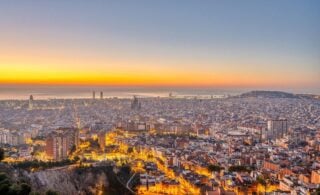
Living in Barcelona is a dream for many, thanks to its balmy Mediterranean climate and vibrant culture. But these aren’t the only reasons why this Spanish city is a top destination for foreigners looking to live, study, and retire in Europe.
Barcelona is more affordable than many other European cities, and its rich history and exceptional lifestyle make it a unique place to call home. If you’re curious about what life as an expat in Barcelona is like, now is the perfect time to start your research and learn everything you need to know before moving.

Find the Best International Insurance
- Compare multiple quotes and coverage options
- Work with an insurance expert at no additional cost
- Find the best plan for your needs and budget
How Much Does it Cost to Live in Barcelona?
Barcelona is a major city, but it’s not the country’s most expensive city. It has the sixth-highest cost of living in all of Spain.
Overall, Spain is one of the most affordable countries in western Europe. The average cost of living in Spain is about 18% less than the cost of living in the United Kingdom. And living in the US is 123% higher than the cost of living in Spain — which is great news for American expats.
Spain’s self-sufficient economy may be one explanation for its lower cost of living. Much of the country’s food and wine, for example, are locally sourced instead of imported.
As of 2023, Barcelona’s population has an estimated GDP per capita of 34,500 euros. As of 2024, the city’s average cost of living for a family of four is 45,612 euros a year, while the average cost of living for a single person is 24,696 euros.
Housing Costs in Barcelona
Barcelona’s population has boomed over the last decade, leading to a rise in housing prices. But in 2023, the Spanish government passed a new property rental law to stabilize rental costs in Barcelona and the rest of Spain.
The average cost of rent in Barcelona as of 2024 is about 600 euros for a private room and up to 1,580 euros for an apartment or home. Of course, these figures may vary depending on the neighborhood in which you live.
Grocery Costs
Since Spain’s domestic agriculture industry is strong, the cost of groceries is relatively low. As of March 2024, water is sold for 0.65 euros per 1.5 liter, one gallon of milk is 3.93 euros, and fresh local cheese is on the market for 5.38 euros per pound. Organic produce from local farmers is often readily available for under 2 euros per pound.
A list of foods and beverages in Barcelona wouldn’t be complete without wine. Spain has a world-class wine industry, and the cost for a single bottle of wine from a nearby vineyard starts at 5 euros.
Transportation Costs
For immigrants who don’t want to buy a car or rely on taxis, Barcelona has excellent public transportation. This includes the city metro, bus system, and trains.
When you need to travel beyond the city limits, it’s easy to find a high-speed train ride to other parts of Spain like Madrid or Valencia. Ready for a weekend trip to Paris? The Spanish train system connects to nearby European countries like France, Italy, and more.
Read More: Living in Spain
Does Barcelona Have a Good Job Market?
 Barcelona is the capital of Spain’s historic Catalonia region. In Catalonia, tourism, sports, and hospitality thrive, but they’re not the only major industries in Barcelona. Some of the biggest employment sectors in the city are healthcare, science, and IT.
Barcelona is the capital of Spain’s historic Catalonia region. In Catalonia, tourism, sports, and hospitality thrive, but they’re not the only major industries in Barcelona. Some of the biggest employment sectors in the city are healthcare, science, and IT.
As of 2024 data, the unemployment rate in Barcelona is 6.1%. Both Barcelona and the country of Spain’s unemployment rate are on the decline, which is a sign of a strong job market.
It’s important for foreigners to understand that most employers in Spain will only hire people who are fluent in Spanish. English-speaking immigrants, however, may have luck finding jobs with global companies in the sales, IT, marketing, and recruiting sectors.
Typically, foreigners who plan to work for a Spanish employer in Barcelona need to be fluent in Spanish. Barcelona is still an international city, of course, so there are English-language jobs to be found if you know where to look.
The Best Neighborhoods for Expats to Live in Barcelona
Hundreds of European cities are home to expat communities, but Barcelona is among the safest destinations for international citizens. The city is home to many low-crime neighborhoods — which is partially why Barcelona ranks as one of the top 20 safest cities in the world.
Below is an overview of the best neighborhoods in Barcelona. These neighborhoods have been selected because of their convenient access to public transportation, as well as their safety and the quality of their amenities and schools.
Gràcia District
The bohemian neighborhood of Gràcia is friendly to foreigners. Its safe, walkable streets are lined by hip boutiques and the breathtaking designs of architects like Antoni Gaudí.
Expats with children will love the neighborhood’s many high-quality schools. Its convenient access to public transportation, grocery stores, and everyday amenities makes Gràcia a top-rated neighborhood.
Les Corts
If you love the hustle and bustle of city living, Les Corts may be for you. This upmarket residential neighborhood is home to the main stadium of the Barcelona Football Club.
Located next to the financial district, the neighborhood is a quick walk to several major shopping malls and tapas restaurants. Les Corts is also the location of several international schools — another reason for its popularity with immigrant families.
Sant Gervasi
Expats who have a bigger budget and seek a quieter place to live should look no further than Sant Gervasi. This lush neighborhood attracts some of the city’s wealthiest residents. Given the higher quality of life, real estate prices in Sant Gervasi start at one million euros.
Even if you have a tighter budget, you may be able to afford this tourist-free neighborhood by sticking to one or two-bedroom apartments. Sant Gervasi’s local shops provide basic groceries and goods. However, you’ll need to take the metro or bus to reach more shopping options within the city.
Horta-Guinardó
Horta-Guinardó is known for its green spaces and access to the Collserola nature reserve. This quiet neighborhood attracts many students and younger families. Its steep streets can make it challenging to get around, but the city has addressed the problem by adding escalators to the steepest areas.
Small, independent owners run most of the local shops. Horta-Guinardó’s streets are not only steep but also narrow, so it’s not easy to find parking. Many residents don’t own cars and prefer to use the metro or bus.
Barcelona Neighborhoods to Avoid
Like in any big city, there are some neighborhoods in Barcelona that are known for crime. These include El Raval, El Besòs I el Maresme, and La Barceloneta.
Note that a few of these neighborhoods are tourist areas, where pickpocketing and other petty crimes contribute to the overall rate of crime.
Read More: The Safest Places to Live in Barcelona
How Can I Cover My Healthcare Expenses While Living in Barcelona?
 Spain has a publicly funded universal healthcare system. It provides coverage for specific, essential medical treatments and procedures to Spanish citizens and legal residents.
Spain has a publicly funded universal healthcare system. It provides coverage for specific, essential medical treatments and procedures to Spanish citizens and legal residents.
Spanish doctors and nurses are highly trained, and the local healthcare industry is known for strong patient outcomes. Spain is consistently ranked as one of the top countries in the world for healthcare.
The universal healthcare system is funded by payroll taxes. As an immigrant in Spain, you can access essential medical care by registering with the government once your visa is approved.
While you’re living in Barcelona, you may need to access treatment that isn’t covered by Spain’s public healthcare. The wait time to access treatment under Spain’s healthcare system can be as long as several weeks or months. Furthermore, immigrants who intend to live in Spain long-term must provide proof of private health insurance coverage to the Spanish government.
Given the above, it’s recommended that expats buy private health insurance in Spain to comply with Spanish immigration laws. A private health insurance plan can also cover the cost of medical treatment that may not be covered under Spain’s public healthcare system, as well as reduce lengthy wait times.

Find the Best International Insurance
- Compare multiple quotes and coverage options
- Work with an insurance expert at no additional cost
- Find the best plan for your needs and budget
Is It Easy To Apply for a Visa to Live in Spain?
With the exception of EU citizens, foreigners must apply for a visa before they can move to Spain or live there long-term. A visa is a legal document that authorizes you to live and work in the country.
Citizens of the EU, the European Economic Area (EEA), and Switzerland do not need a visa to live, work, or study in Spain. However they are still required to register their address with the local Spanish authority if they plan to live in the country for longer than three months.
All other immigrants (including citizens of the UK who were not legal residents of Spain before January 1, 2021) must apply for a visa before they can live, work, or study in the country. Common Spanish visas include the digital nomad visa for those who are self-employed, study and research visas for international students and academics, work visas, and entrepreneur visas.
Once you complete and submit your visa application, you’ll be contacted to make an appointment at the closest Spanish consulate. Immigrants should also apply for a residency permit after their visa has been approved.
What to Know About Spanish Culture Before Moving to Barcelona
Most people in Barcelona are bilingual in Spanish and Catalan, but French and German are widely spoken as well. English is most common in the city’s tourist-friendly districts. As a result, immigrants who are native English speakers are more likely to find jobs in the hospitality and tourism sectors.
Socializing in Barcelona
If you’re an expat who’s eager to blend with Spanish locals, you’ll need to do more than learn how to speak their language. Discover as much as you can about Spanish culture and customs before you immigrate.
For example, Barcelona residents affectionately refer to the city by its nickname, Barna. Locals tend to close their businesses or take a break from work for a “siesta” between either 1 and 2 p.m. or 4 and 5 p.m. Dinner is usually served late, closer to 10 p.m.
You’ll also find that Spaniards prefer meetups in public spaces, like bars or cafes, than in their homes. The European tradition of enjoying wine, beer, or spirits before dinner is also alive and well in Barcelona.
Sightseeing in Barcelona
Once you’ve settled in Barcelona and are ready to explore, consider a visit to the scenic Catalan coastline of Costa Brava. The region covers the northern tip of Barcelona to the border of France. It’s known for picturesque landscapes, medieval villages, and excellent restaurants.
You can also plan a visit to the Sagrada Familia. The largest unfinished Catholic church in the world, it’s located in the Eixample district of the Barcelona city center. Next, take a ride to explore the Gothic Quarter, also known as Barrio Gòtico. Here, you’ll find trendy bars and Catalunya-style cuisine.
Get our monthly newsletter filled with tips and information for people living, moving, and traveling outside of their home country.* *By submitting your email, you agree to receive monthly updates for expats, digital nomads, retirees, and more.
Ready to Dive Into Barcelona’s Charm?
Barcelona is an exceptional city for expats seeking a blend of culture, affordability, and an easy-going lifestyle. The vibrant atmosphere, rich history, and Mediterranean charm make it an attractive destination for foreigners to live, work, and enjoy life in Spain.
With its moderate cost of living, excellent public transportation, and a thriving job market in sectors like healthcare, IT, and tourism, Barcelona offers numerous opportunities for expats to settle comfortably.
Whether you’re moving for work, study, or retirement, this Spanish gem has something for everyone. Start planning your move and enjoy the Mediterranean way of life in one of Europe’s most beautiful cities.